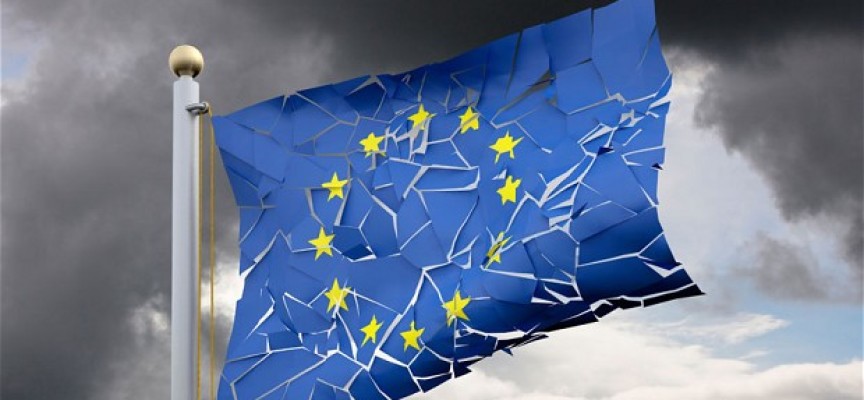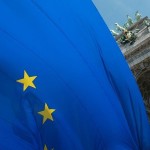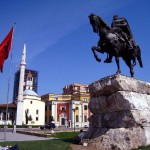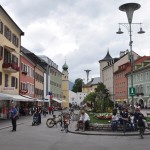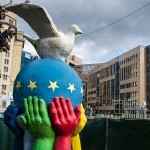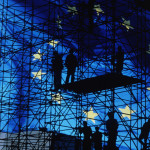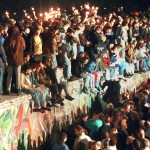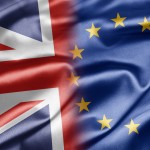The cold wind which has blown undaunted from the north of Europe these days has perhaps caused fierce damages to the process of European integration. Europe, grappling with a severe economic crisis, tired and depressed, decadent because launched to a merciless old age caused by population decline, drunk with his recent technological progress, which has caused corruption, crime, moral libertinism in addition to well-being, has found scapegoats in Islam, identified only with terrorism.
Even nations of ancient political democracy and democratic tolerance, such as the Netherlands and the Scandinavian countries, appear to be infected with racism, while Hungary, eager perhaps to take revenge of the humiliation resulting from the First World War and forgetful of the recent Soviet yoke, has raised barriers to defend against who is fleeing from wars and poverty. “Closing the door does not guarantee safety, and history has shown this – writes Baumann, the famous scholar of social phenomena –. The only way to increase security is not to build other walls, but to create open spaces where everyone can talk and feel part of the same world”.
In this way Europe was built: with great hope and little fear. Today there is a lot of fear of the other, because of the economic crisis, the conflicts and, unfortunately, we seem to see not much hope.
This is not the Europe desired by the founding fathers. The pillars on which is based – or used to be based – the European construction inspired by Jean Monnet, realised by Robert Schuman, einforced by Alcide de Gasperi, become a stimulus for the Franco-German reconciliation by Konrad Adenauer, were four: to ensure peace through prosperity in a spirit of solidarity and in a supranational community.
Since the days of the founding fathers up to now, peace has been insured not only in Europe (let’s just think to the end of the warfare between the United Kingdom and Ireland, the fall of the Berlin Wall occurred without bloodshed!), but has seen the revival of local identities and cultures that had disappeared in national homogenisation (think of the Czechs and Slovaks, the Bretons, the Alsatians, the Corsicans, the Flemish and the Walloons, the Welsh and Scots, the Basques and Catalans!), and that, thanks to the spirit of European unity (“unity in diversity”), has allowed them to develop, but also, unfortunately, to turn on themselves and to retreat from the rest of the world. So were born those localisms that let people see only their own interests and so Europe is crumbling.
The European condition of today is in fact the brittleness, which is not weakness: it is realizing that economics cannot any longer unite nations. Europe is in search of the European spirit lost under the pickaxe of shortsighted and forgetful governments for which Europe is not an ideal project, but a commodity. To the pioneers of Europe, peace was an imperative, not a political strategy; a moral and spiritual project before being diplomatic shrewdness; a common destiny of nations, not the small private backyard where to cultivate one’s economic interests.
Peace, harmony in Europe today are necessities that must be safeguarded in understanding, mutual trust and respect, solidarity. To continue his journey of peace Europe today needs leaders, not people leader. True leaders use their charisma to resolve conflicts, not to expand them; they do not impose their electoral power to get everything at once, but they mediate; they take note of the different opinions, strive to loyally recognize the portion of truth found in the opinions of the others; look at a horizon wide and perhaps far from reach, not to the first round of voting!
Christians have to be the sentinels who watch to conserve and safeguard the gift of peace, to combine security and solidarity, ethics and finance, to pass from assistance to greater social justice, and especially they have to renew their lifestyle with greater sobriety. It will be particularly important to educate, that is to convince that there is no way out outside Europe: either we save all together or we will perish together! We need to give hope in the future to young people, which are beyond the memories of the two world wars experienced by their fathers and grandfathers. This is the commitment of all peacemakers.
Il vento gelido che dal Nord Europa ha soffiato imperterrito in questi giorni ha forse provocato danni cruenti al processo d’integrazione europea. L’Europa, alle prese con una grave crisi economica, stanca e depressa, decadente perché avviata a un’impietosa vecchiaia causata dal calo demografico, ebbra del suo recente progresso tecnologico, che ha provocato oltre che benessere anche corruzione, criminalità, libertinaggio morale, ha trovato il capro espiatorio nell’islam, identificato solo con il terrorismo.
Perfino nazioni di antica democrazia politica e di tolleranza democratica, come i Paesi Bassi e le nazioni scandinave, sembrano essere contagiate dal razzismo, mentre l’Ungheria, desiderosa forse di prendersi la rivalsa delle umiliazioni conseguenti alla prima guerra mondiale e dimentica del recente giogo sovietico, ha innalzato barriere per difendersi da coloro che fuggono dalle guerre e dalla miseria. “Chiudere la porta – scrive il noto studioso dei fenomeni sociali Baumann – non garantisce la sicurezza, e la storia l’ha dimostrato. L’unico modo per accrescere la sicurezza non è costruire altri muri, ma creare spazi aperti nei quali tutti possano dialogare e sentirsi partecipi dello stesso mondo”.
Così è stata costruita l’Europa: con molta speranza e poca paura. Oggi c’è molta paura per il diverso, per la crisi economica, per i conflitti e, purtroppo, ci sembra scorgere poca speranza. Non è questa l’Europa voluta dai padri fondatori. I pilastri su cui si fonda – o si fondava? – la costruzione europea ispirata da Jean Monnet, realizzata da Robert Schuman, rinforzata da Alcide de Gasperi, divenuta sprone per la riconciliazione franco-tedesca da parte di Konrad Adenauer, erano quattro: assicurare la pace attraverso la prosperità in uno spirito di solidarietà e in una comunità sovranazionale.
Dai tempi dei padri fondatori a oggi, la pace non solo è stata assicurata in Europa (si pensi alla fine della guerriglia tra Regno Unito e Irlanda, alla caduta del muro di Berlino avvenuta senza spargimento di sangue!), ma ha visto il rifiorire delle identità e culture locali che erano scomparse nelle omologazioni nazionali (si pensi ai cechi e agli slovacchi, ai bretoni, agli alsaziani, ai corsi, ai fiamminghi e ai valloni, ai gallesi e scozzesi, ai baschi e catalani!) e che, grazie allo spirito europeo unitario (“unità nella diversità”), hanno potuto svilupparsi, ma anche, purtroppo, ripiegarsi su se stesse e sottrarsi dal resto del mondo. Sono così nati i localismi che portano a vedere solo i propri interessi e l’Europa si sta così frantumando.
La condizione europea d’oggi è infatti la fragilità, che non è debolezza: è il rendersi conto che l’aspetto economico non può più unire le nazioni. L’Europa è alla ricerca dello spirito europeo perduto sotto le picconate di governi miopi e smemorati per i quali essa non è un progetto ideale, ma un bene di consumo. Per i pionieri dell’Europa, la pace era un imperativo categorico, non una strategia politica; un disegno morale e spirituale prima che una scaltrezza diplomatica; un comune destino di popoli, non il piccolo orticello privato in cui coltivare i propri interessi economici.
La pace, la concordia oggi in Europa sono beni primari che devono essere salvaguardati nella comprensione, nella fiducia e rispetto reciproci, nella solidarietà. Per continuare il suo cammino di pace l’Europa oggi ha bisogno di leader, non di capi-popolo. I veri leader usano il loro carisma per dirimere i conflitti, non per ampliarli; non impongono il loro potere elettorale per ottenere tutto e subito, ma sanno mediare; prendono atto delle diversità d’opinione, si sforzano di riconoscere lealmente la parte di verità presente nelle altrui opinioni; guardano a un orizzonte ampio e forse lontano da raggiungere, non alla scadenza della prima tornata elettorale!
I cristiani siano le sentinelle che vigilano per conservare e salvaguardare il dono della pace, per coniugare sicurezza e solidarietà, l’etica con la finanza, per passare dall’assistenza a una maggiore giustizia sociale, soprattutto rinnovino con maggiore sobrietà il loro stile di vita. Occorrerà soprattutto educare, cioè convincere che fuori dell’Europa non c’è via di scampo: o ci si salva tutti assieme o si perisce tutti assieme! Ai giovani, ai quali sfuggono i ricordi di due guerre mondiali vissute dai loro padri e nonni, occorre donare speranza per il loro futuro. Questo è l’impegno di tutti gli uomini costruttori di pace.
Edoardo Zin
Latest posts by Edoardo Zin (see all)
- 60° Treaties of Rome: a Europe that struggles and hopes - 19 marzo 2017
- Europe lacks the great politics - 28 dicembre 2016
- The strength of Robert Schuman - 30 aprile 2016

